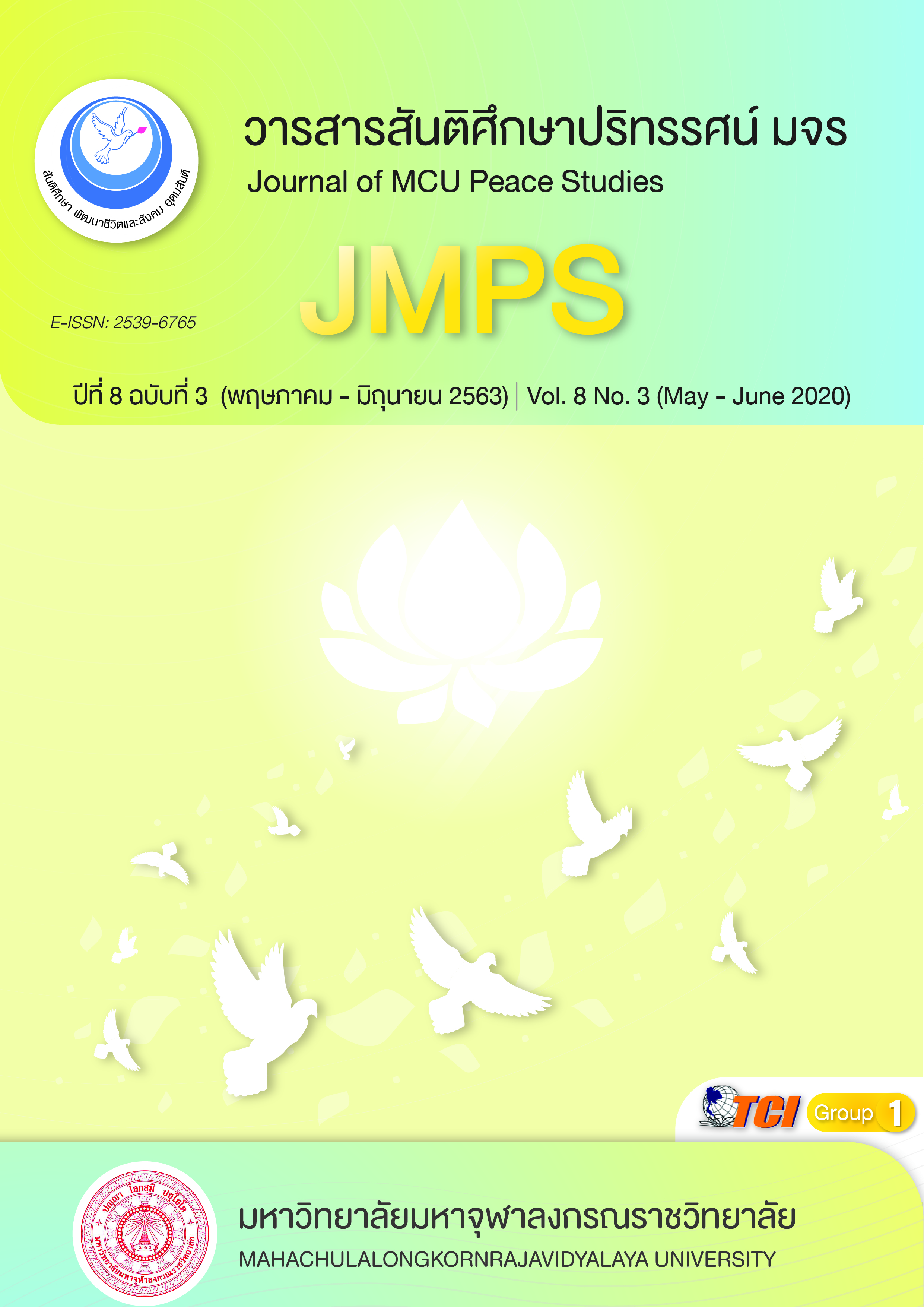รูปแบบเทคนิคการพูดสร้างแรงบันดาลใจในการทำงานจิตอาสาโดยพุทธสันติวิธี
Main Article Content
บทคัดย่อ
The purpose of this research aimed at presenting a model of Motivational Speaking Techniques in volunteering by Buddhist Peaceful Means. It was a qualitative research.
The sample of this study was motivational-speaking volunteers. They were selected by purposive sampling using a semi-structured interview with 14 respondents. The data from the interview was analyzed with the related literature review.
The research findings were a model of motivational speaking techniques, which is called “SPEAK-HANSA Model” was developed based on the Buddhist doctrines as follows: the Four Bases of Social Solidarity (Saṅgahavatthu); Dhamma of Bodhisattva, namely Purity (Suddhi), Wisdom (Paññā), Loving-kindness (Mettā), and Tolerance (Khanti); and the Four Sublime States of Mind (Brahmavihāra). In short, the important principles consist of dedication, patience and caring. The SPEAK model for the speaking techniques has the following meanings: “S” refers to Story Telling of Personal Experiences to the audiences as an example; “P” refers to Present Moment by being mindful and concentrate on the audiences; “E” refers to Emotion as a stimulus to gain interest from the audiences; “A” refers to Asking Question; and “K” refers to Knowledge sharing of what the speaker is skilled in. The expected results of the audiences are called HANSA which refers as follows: “H” refers to Happiness; “A” refers to Awareness; “N” refers to New Behavior”; “S” refers to Self-esteem; and “A” refers to Achievement, in order words, a commitment to achievement.
The research result is the new knowledge on a model of the motivational speaking techniques in volunteering for applying to the motivational speaking for various groups of people to have a positive change by starting from a small group to a wider society in the end.
Article Details
ทัศนะและความคิดเห็นที่ปรากฏในบทความในวารสาร ถือเป็นความรับผิดชอบของผู้เขียนบทความนั้น และไม่ถือเป็นทัศนะและความรับผิดชอบของกองบรรณาธิการ ยินยอมว่าบทความเป็นลิขสิทธิ์ของวารสาร
เอกสารอ้างอิง
Akwareesakul, A. & Patpong, P. (2019). A discourse structure of inspiration talks in Thai. Journal of Language and Culture, 48(1), 1-23.
Jarusaksri, T. (2016). The Development of Self Mastery Through Neuro-Linguistic Programming Group Counseling. Ph.D. Dissertation. (Faculty of Education). Burapha University.
Kokiatcharoen, W. (2001). A Summary of Thai society situations in 1996: Point of view and proposals from private organization network. Bangkok: Development and communication committee.
Mahachulalongkornrajavidyalaya University. Thai Tipitakas. Bangkok: MCU Press.
Office of the National Economics and Social Development Council. (2019). Eighth National Economic and Social Development Plan (1997-2001). (n.p.).
Office of the National Economics and Social Development Council. (2019). Ninth National Economic and Social Development Plan (2002-2006). (n.p.).
Office of the National Economics and Social Development Council. (2019). Tenth National Economic and Social Development Plan (2007-2011). (n.p.).
Office of the National Economics and Social Development Council. (2019). Twelfth National Economic and Social Development Plan (2017-2021). (n.p.).
Thiranet, A. (2000). Persuasive Communication Strategies in Lord of Buddha’s Scripture. Master of Arts (Development Communication). Chulalongkorn University.
Western, D. (2019) 10 Most Motivational Speakers in the world. Wealthygorilla. Retrieved November 1, 2019, from https://wealthygorilla.com/10-best-motivational-speakersworld/
The royal coronation of King Rama X communication committee, King’s Private Offices 904 the Royal Initiative Volunteers. Retrieved February, 25, 2020 from http://phralan.in.th/coronation//royaldutiesdetail.php?id=107.


